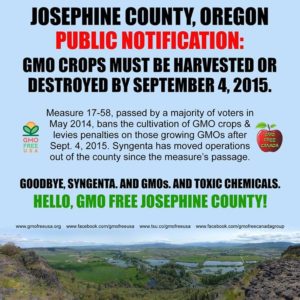 ATTENTIONÂ all farmers growing GMO crops in Josephine County (if any):
ATTENTIONÂ all farmers growing GMO crops in Josephine County (if any):
Please notify authorities you are growing said crops, in order that you may be penalized if you continue to grow them past Sept. 4.
That’s the essence of a public notice due to be published by the county, following voter passage last year of a local measure banning the cultivation of genetically modified organisms, or GMOs.
County Counsel Wally Hicks said last week that his office is fine-tuning the notice in preparation for publication in the Daily Courier.
Following voter passage of the ban in May 2014, any farmers growing GMO crops had a 12-month window to harvest or otherwise get rid of the crops, according to the measure.
The notice being published states that farmers currently growing GMO crops must contact the Josephine County Sheriff’s Office with their name, crop location and crop type, plus a phase-out plan to be done by Sept. 4.
Anyone violating the ban could be subject to having their crops confiscated and destroyed, and would have to pay costs of the abatement and costs for any damage done to other crops, according to the new ordinance. Commissioners a few weeks ago approved publication of the notice.
All of this is good news for Ted Talk and Lyn Colley-Talk, operators of Singing Bird Farm, 5800 Redwood Highway. They are neighbors to a former 46-acre GMO crop field used by Swiss sugar beet company Syngenta.
“I’m excited,†Colley-Talk said.
Syngenta, which helped bankroll an $800,000 effort to defeat the measure, pulled out shortly after voters approved the ban 58 to 42 percent. Farmers and supporters of the ban worry that GMO crops will cross-pollinate and contaminate non-GMO crops.
Ted Talk didn’t like what he said was Syngenta’s use of fungicide, and said company trucks kicked up dust that sickened him.
“Once they were gone, nobody was sick anymore,†he said.
It appears that Syngenta also has moved out of a nearby warehouse, where a company sign is gone and the place is overgrown with weeds. They had farmed the area for about 20 years, Talk said. He believes that Syngenta merely has moved to other counties in Oregon, and he and his wife are not aware of any other GMO operations in the county.
Hicks said he has heard no reports of GMO farming currently underway in Josephine County. Syngenta reportedly has also pulled out of Jackson County, which passed its own ban in 2014.
Bob Crouse of Fort Vannoy Farms west of Grants Pass said he quit growing GMO corn two years ago.
But the GMO issue is not entirely resolved in the Rogue Valley.
An estimated 2,000 to 3,000 acres in Jackson County have been used for GMO crops grown by local farmers, primarily alfalfa and corn for animal feed. A federal judge in May rejected a claim by farmers that the ordinance violated their “right to farm†under state law. Their claim that they should get $4.2 million in compensation from the county is still pending, however, and county officials agreed not to enforce the GMO ban until it’s resolved.
The legality of Josephine County’s ban remains in doubt because of a law approved by the Oregon Legislature banning local bans on genetically modified crops. The legislation exempted Jackson County, which started its initiative before the law was approved.
Supporters of the ban in Josephine County say the legislation was illegally backdated and that the signature-gathering process to place a ban on the ballot was well under way locally before the Legislature weighed in.
Source:Â Mail Tribune
* * *
A Josephine County Genetically Modified Organism Ban, Measure 17-58 ballot question was on the May 20, 2014 election ballot for voters in Josephine County, Oregon, where it was approved.
This measure banned the production or cultivation of any genetically modified or engineered crop within the boundaries of Josephine County. Measure 17-58 gave exceptions to “state or federally licensed medical research institutions, medical laboratories, or medical manufacturing facilities engaged in licensed medical production, or medical research involving genetically modified organisms.†It also allowed farmers and cultivators with genetically modified crops already planted 12 months to harvest and cease the growth of such crops.[1]
Late in 2013, the group GMO-Free Josephine County turned in 1,997 signatures to qualify their GMO-banning initiative for the May 20, 2014 election ballot. On February 18, 2014, the Josephine County Clerk’s office verified that the petition was sufficient and certified Measure 17-58 for a voter decision.[2][3]
GMO-Free Josephine County worked with GMO-Free Jackson County, which coordinated a similar measure, Measure 15-119, to bring about a GMO-free Rogue Valley.[4]
This measure flew directly in the face of 2013 statewide legislation. On October 3, 2013, Oregon legislators, in a 17-12 vote, approved Senate Bill 863, which prohibited Oregon counties, excepting Jackson County, from regulating or banning genetically modified organisms. SB 863 claimed an emergency status in an unsuccessful effort to preclude initiatives against GMOs in Benton and Lane counties.[5] GMO-Free Josephine County decided to move forward with their initiative despite this state law. Co-petitioner Mary Middleton said that initiative backers disapproved of the state prohibiting local legislation on this issue, which was important to many local farmers and residents. She also said they were willing to let the courts decide if the state had the power to stop or invalidate their initiative.[3]

This is terrific – a good spokesman and well-organized explanation. I’m tipping my hat. Jill M.